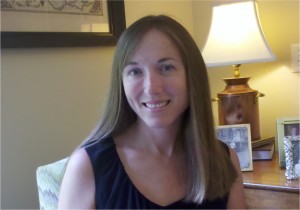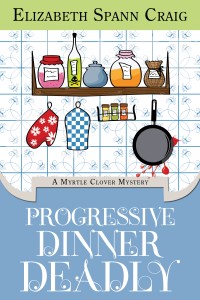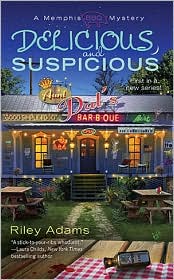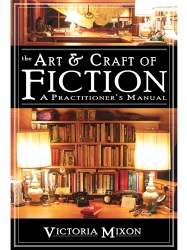 Elizabeth Spann Craig is well-known in the online writing community for her Writers Knowledge Base—the Search Engine for Writers, where she maintains links to all the best posts on writing online, and her weekly Twitterific post, rounding up the weeks’ exchange of writing posts through Twitter on her blog, Mystery Writing is Murder.
Elizabeth Spann Craig is well-known in the online writing community for her Writers Knowledge Base—the Search Engine for Writers, where she maintains links to all the best posts on writing online, and her weekly Twitterific post, rounding up the weeks’ exchange of writing posts through Twitter on her blog, Mystery Writing is Murder.
But that’s not all—not even half! Because Elizabeth’s understanding of writing craft is based solidly in her popular mystery series, published through Penguin and her own imprint: the Memphis Barbeque Mystery series with Penguin/Berkley under the pseudonym Riley Adams, the Southern Quilting Mystery series with Penguin/NAL, and the Myrtle Clove series with Midnight Ink.
Elizabeth’s a busy woman! And today she’s taken time to talk with us about the dark, labyrinthine ways of both our favorite genre. . .mystery.
Elizabeth, so lovely to have you here! I know your forte is mystery, as is mine, so let’s be completely self-indulgent today and talk of nothing but mysteries. Who are your favorite mystery authors?
Thanks so much for hosting me, Victoria! I’m excited to be here. I love indulging in a conversation about mysteries—my favorite topic.
I have lots of favorite mystery authors, and I love them for different reasons. Agatha Christie is my all-time favorite because I love her quirky sleuths and their unusual approaches to solving crimes. M.C. Beaton has been a more recent favorite. Her Hamish Macbeth and Agatha Raisin sleuths are very human and fallible, but know how to capitalize on their individual strengths. And I’m amazed by the work of Elizabeth George (especially her earlier books), Deborah Crombie, Caroline Graham, Ruth Rendell, Colin Dexter—yes, I could go on and on ad nauseum. Who are some of your favorites?
Well, Raymond Chandler, you know. Anyone who can say, “He had a chin like a strap-hanger’s elbow,” owns me. I love the classics and Golden Age writers: Poe, Conan Doyle, Ellery Queen, Chesterton, Hammet, Gardner, Sayers, Van Dine, Stout. Let’s not forget the brilliant Wilkie Collins. Robert van Gulick wrote Westernized versions of Chinese mysteries about a real fifth-century judge. Ngaio Marsh’s charming Detective-Inspector Alleyn. Georges Simenon’s deadpan noir Maigret. Alexander McCall Smith’s hilariously pragmatic Precious Ramotswe. And I’ve recently discovered Derek Raymond and his haunting How the Dead Live.
 Oh, we could turn this whole interview into a list of names! I’m addicted to the Gold Room at Powell’s Books in Portland, Oregon. Have you ever been there?
Oh, we could turn this whole interview into a list of names! I’m addicted to the Gold Room at Powell’s Books in Portland, Oregon. Have you ever been there?
No, I sure haven’t, but it’s legendary. I’m very envious! I’d probably get absorbed and forget to leave and they’d have to send a search party after me.
[Laughing] Such a dangerous place.
Recently I’ve discovered that some really old mystery titles from the Golden Age and lesser-known authors are becoming available on e-readers. It’s fantastic to be able to find and enjoy some treasures from the past.
So how did you get into mysteries? What first made you love them?
I’m a little bit of a cliche there. I’m one of those mystery writers who was heavily influenced by Nancy Drew as a kid. I read all the Nancy Drews I could get my hands on. . .my mother had ladies tearing up their attics looking for old bags of Nancy Drew books. I plowed through mysteries wherever I could find them—Hardy Boys, Trixie Belden—even watching Scooby Doo on television. Yes, I was even one of those kids who had a detective notebook of observations and recorded what adults were doing and saying. It kind of bordered on the fanatical, now that I think of it!
As a teenager, I started moving into adult mysteries. I read Christie, Sayers, and Carr before moving into P.D. James. I love a whole range of mysteries—private eye, police procedural, thriller, noir—and feel like I’ve been influenced by all of them, although I’m writing traditional mysteries/cozies.
I just love the puzzle aspect of mysteries and the fact that it’s an almost interactive experience—we solve the case alongside the sleuth. I also enjoy being scared, in a safe way. With a mystery, I get a safe thrill. If a book gets too intense, I can close it or shut down the Kindle and return to safety quickly. I think that’s one reason so many readers like traditional mysteries—the murders occur in a tranquil, safe environment. It disrupts the town, but then everything is tidily returned to normal by the end of the book. It’s a satisfying feeling.
Exactly. The triumph of sanity over insanity. Hey, remember Louise Fitzhugh’s children’s book, Harriet the Spy? Very odd, insightful take on what the world of sleuthing is all about in the childlike recesses of the human mind. Did you ever read it?
 I sure did. . .maybe because I was also an odd child with a notebook! Of course in an adult murder mystery little Harriet, with all her eavesdropping, would have known too much. . .she’d have met with an untimely demise.
I sure did. . .maybe because I was also an odd child with a notebook! Of course in an adult murder mystery little Harriet, with all her eavesdropping, would have known too much. . .she’d have met with an untimely demise.
[Laughing] That’d make a fabulous children’s mystery—you’d better write it! It’s strange to read Raymond Chandler’s letters from the 1950s, when he railed against the difficulty of mystery earning its rightful place in the canon. And now there’s a whole world of literature based on, as you say, that sense of “safety” in exploring frightening themes, the puzzle that satisfies the intellect. What is your favorite mystery technique or storyline?
You know, there are just so many elements that make up a great mystery. It takes real skill to keep readers from guessing the murderer’s identity without making them frustrated. One of my favorite techniques is the unreliable witness, which Agatha Christie used to such great effect. It involves discrediting a witness/supporting character by either showing his incompetence, lack of intelligence, or immaturity (if the witness is a young child), and then having him either unveil a major clue or actually name the murderer or motive. Since the readers don’t respect the character, they won’t give credence to his statements. It’s a fun technique to play around with.
Oh, excellent. Yes. I just re-read Shirley Jackson’s canonical ghost story, The Haunting of Hill House, and the way she confuses the reader about who’s portraying the truth and who’s simply bonkers—genius! So what’s the most common failing you see in unsuccessful mysteries?
I read a lot of reviews of mysteries, actually, because I’m interested in finding out what readers like and dislike most. One of the biggest complaints that I see is when readers lose respect for the sleuth. Over and over again, I’ve read reviews where readers were upset because a sleuth did something stupid, just so the writer could further the plot. If the reader loses respect for the sleuth, it really compromises the story. So if the detective needs to go into a remote part of town—by himself, at night—when he knows the murderer is probably lurking nearby, the writer needs to have to have an excellent reason for it. Does the detective think he’s going there to meet someone else? Did he suddenly realize there was a clue that he’d overlooked before—and the killer happens to realize the same thing simultaneously? There has to be a good reason for our supposedly intelligent sleuth to endanger himself.
You’re so right. No matter what the genre, it’s always about character motivation. ‘What does this sleuth need? Why are they driven to solve this mystery?’ Marlowe often thinks he needs nothing more than to make his twenty-five bucks a day, but it’s layered with his overwhelming need to see justice done. Is there a mystery angle you’d like to explore but don’t believe could be successfully pulled off?
Oh, sure. I’m a fan of unreliable narrator stories (as well as the unreliable witnesses I mentioned above.) But. . .it’s very tricky. When it’s done well, it makes such an amazing twist ending. I’d mention some examples in mystery literature and also some recent examples that were done well on film, but I don’t want to spoil the fun for anyone. It’s a difficult technique because if it isn’t done well, the reader/viewer feels cheated or manipulated. If it is done well, the reader gets a surprise ending that causes them to think about the entire book in a different way.
I’m going to name Christie’s Roger Ackroyd as the most obvious example of this. If there’s anyone left who hasn’t read it yet—I’m sorry! It’s still a good read. What do you think of Chandler’s claim that, no matter what anybody says about the Rule of Fair Play, there’s no such thing as a 100% honest mystery?
 I think Chandler is right. Mystery writers have to employ trickery in their books. We’re deflecting attention from clues, sending readers on wild goose chases, and generally deceiving the reader. But—we have to be at least a little deceptive to give the readers a satisfying read. We have to play fair, but we can’t let the reader learn the killer’s identity in Chapter Four. That’s not fair to them, either.
I think Chandler is right. Mystery writers have to employ trickery in their books. We’re deflecting attention from clues, sending readers on wild goose chases, and generally deceiving the reader. But—we have to be at least a little deceptive to give the readers a satisfying read. We have to play fair, but we can’t let the reader learn the killer’s identity in Chapter Four. That’s not fair to them, either.
That’s a fabulous point: it’s not fair to the reader to ruin the mystery. We all read for fun. In fact, mystery is one of a handful of highly-popular modern genres all based upon the intensity of the thrill. What qualities do you think mystery shares with horror, thriller, paranormal, romance?
 The biggest thing all genre fiction has in common is its popular appeal. Genre writers know that when their book is published they will have a group of readers waiting for their release. It’s like having a built-in, established readership. Genre fiction writers bring books to the people—books that are usually accessible, interesting, and entertaining. Genre fiction’s goal is to pull readers into the world of the story instead of distracting them with the intrusion of heavy use of literary devices or the author’s opinions/viewpoints.
The biggest thing all genre fiction has in common is its popular appeal. Genre writers know that when their book is published they will have a group of readers waiting for their release. It’s like having a built-in, established readership. Genre fiction writers bring books to the people—books that are usually accessible, interesting, and entertaining. Genre fiction’s goal is to pull readers into the world of the story instead of distracting them with the intrusion of heavy use of literary devices or the author’s opinions/viewpoints.
You know, even literary fiction isn’t supposed to interfere with the story, only seduce the reader with language rather than excitement. I do miss good experimental fiction. What’s the weirdest mystery you’ve ever read?
The weirdest mystery I’ve ever read is the first detective story ever written: Poe’s “The Murders in the Rue Morgue.” It’s creepy, baffling, carries a violent theme throughout the story, and has a fairly horrifying solution. But then. . .that’s Edgar Allan Poe for you! It’s not a mystery that would play well for today’s readers, since the reader doesn’t really have a fair shot at solving the case.
It’s true, Poe failed to incorporate Fair Play, but that’s one of those little inconsistencies that will occur when you’re inventing an entire new genre. Did you know his second mystery, “The Mystery of Marie Roget,” was based on an unsolved murder to which the perpetrator later confessed, saying, “He pretty much nailed it”?
I loved “Marie Roget,” but didn’t realize the story was based on a true crime. Interesting! I wonder what Poe thought about his role in solving the real case (or prompting a confession from the killer?)
What an amazing man—I wish he’d written about his knowledge of the craft. What are your favorite books on the craft of writing mysteries?
The ones I’ve got on my shelf are:
Don’t Murder Your Mystery—Chris Roerden
Book of Poisons—Serita Stevens, Anne Bannon
Police Procedure & Investigation: A Guide for Writers (Howdunit)—Lee Lofland
The Weekend Novelist Writes a Mystery—Robert J. Ray, Jack Remick
Telling Lies for Fun & Profit: A Manual for Fiction Writers—Lawrence Block
Writing the Modern Mystery—Barbara Norville
How to Write a Damn Good Mystery—James N. Frey
Don’t Murder Your Mystery and Telling Lies for Fun and Profit are great no matter what genre you write.
Occasionally, my husband looks at the bookshelf and gets a little nervous. He reminds the kids that if anything ever happens to Daddy, they need to tell the police what Mama does for a living!
 Elizabeth Craig is the author of Finger Lickin’ Dead and Hickory Smoked Homicide, among other mysteries. She writes the Memphis Barbeque for Penguin/Berkley (as Riley Adams), the Southern Quilting mysteries (2012) for Penguin/NAL, and the Myrtle Clover series for Midnight Ink. She blogs at Mystery Writing is Murder, which was named by Writer’s Digest as one of the 101 Best Websites for Writers for 2010 and 2011.
Elizabeth Craig is the author of Finger Lickin’ Dead and Hickory Smoked Homicide, among other mysteries. She writes the Memphis Barbeque for Penguin/Berkley (as Riley Adams), the Southern Quilting mysteries (2012) for Penguin/NAL, and the Myrtle Clover series for Midnight Ink. She blogs at Mystery Writing is Murder, which was named by Writer’s Digest as one of the 101 Best Websites for Writers for 2010 and 2011.
Elizabeth can be found on her blog, Mystery Writing is Murder, on the Writer’s Knowledge Base—the Search Engine for Writers, on Twitter, and on Google+.
“The freshest and
most relevant advice
you’ll find.”
—Helen Gallagher,
Seattle P-I
The Art & Craft of Story


